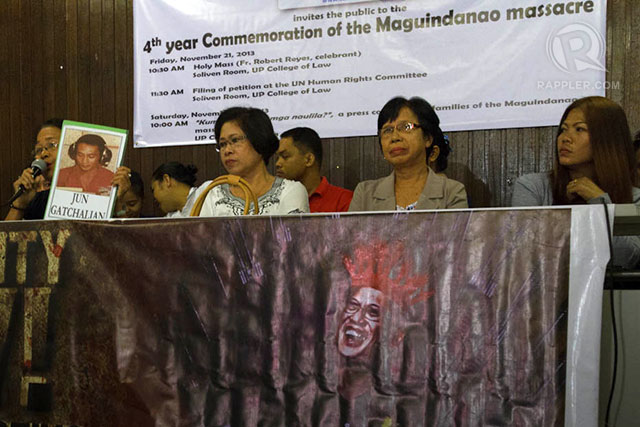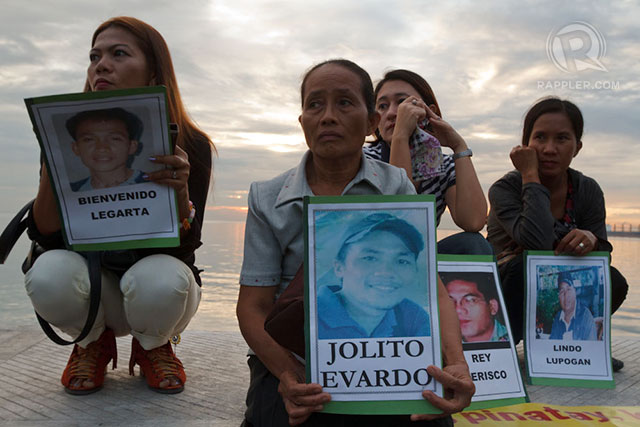SUMMARY
This is AI generated summarization, which may have errors. For context, always refer to the full article.

MANILA, Philippines – The families of victims of the Maguindanao massacre – the most gruesome politically-motivated kiling in Philippine history – are demanding compensation from government.
“We believe that the government should pay us the compensation because the rights of our loved ones had been violated,” said Naomi Parcon, a widow of one of the 58 who were murdered, in a press conference on Saturday, November 23, exactly 4 years after the massacre.
A number of them being bribed by the principal suspects to drop their complaints, and with a number of witnesses being killed, the families believe the government should be paying them because the alleged masterminds of the incident were state actors, Parcon said. (READ: The Ampatuan massacre: Lest we forget)
On Nov 23, 2009, the politically powerful Ampatuan clan sent armed men to assail a convoy that included the wife of rival politician Esmael Mangudadatu, his supporters, family members, and journalists. The convoy was on its way to file Mangudadatu’s candidacy, challenging Andal Ampatuan Jr in the gubernatorial race in the following year’s elections.
The armed men led them to a nearby hilltop and executed them, burying them in mass graves using a backhoe.
Unfulfilled promises
In a press conference held at the UP College of Mass Communication on Saturday, the widows of the victims criticized President Benigno Aquino III for failing to fulfill his promise of getting them justice.
Their group filed a complaint on Friday with the United Nations Human Rights Committee, two years after being denied by ASEAN Commission on Human Rights because of its limited jurisdiction on the matter.
“As far as I can remember, PNoy has promised us that once he gets elected as president, hindi niya pababayaan ‘yung kaso namin at sisiguraduhin niya na before siya bumaba, makakamit na namin ang hustisya,” Parcon lamented. (He promised he wouldn’t abandon the case and he would ensure that before he steps down, we will attain justice.)
In a radio interview on Saturday, Deputy Presidential Spokesperson Abigail Valte said the President wants to see justice served as much as the victims’ families do, but that he cannot meddle with the court proceedings. What Malacañang ensures, she said is, that “we are not the cause of delay.”
Parcon also said their proposal for livelihood programs had been ignored by President Aquino.
“Nag-request kami, gumawa kami ng proposals, tatlong taon ang nakalipas, walang dumating na livelihood programs sa amin,” she said. (We requested, we made proposals, 3 years have passes and we have not seen any livelihood programs.)
Symbol of weak justice system
None of those charged for the massacre has been convicted. Eighty-eight suspects remain at large. The court has been overwhelmed by bail petitions and testimony challenges by the lawyers of the 101 suspects in custody. (READ: DOJ: Ampatuan massacre convictions by 2016)
Despite holding almost weekly hearings, Attorney Harry Roque, legal counsel of the victims, said the trial is only 20% done.
At this pace, Parcon believes, it may take 20 years before justice is served.
Senator Alan Peter Cayetano said the case is not only a pursuit of justice for the murdered journalists but should be a catalyst for judicial reform.
“What is happening is, the Ampatuan massacre is becoming a symbol of the weakness of our country’s criminal justice system,” he said in a mix of Filipino and English.
“This is not only a judicial issue, but this also involves our prosecutors and all of us. More than 50% of people behind bars are not convicted. Many of them have been in jail for several years yet have only stepped inside the court two or 3 times.”
The senator asked: If the Supreme Court was able to decide quickly on the pork barrel issue, why can’t it speed up the arduously slow process for the Maguindanao massacre?
Call to end impunity

Out of the 58 who died in the massacre, 32 were journalists, making the incident the single deadliest event for media workers in history, according to the Committee to Protect Journalists.
November 23 is also commemorated as the International Day to End Impunity
Gilbert Andres, from Media Defense Southeast Asia, said Saturday they will be sending a letter of allegation before the United Nations Special Rapporteur that includes Rapporteur on Freedom of Expression, Extrajudicial Execution and Reparations.
“We want these experts on human rights to declare that these numerous instances of extrajudicial killings [are] a gross violation of human rights and should be stopped by the Philippine government by vigorous investigation and prosecution,” Andres said.
He added that the government has the obligation to ensure that the right of freedom of expression is respected.
Also on Saturday, the families of the victims, together with media practitioners, formed a human chain along Roxas Boulevard in Manila as a gesture of solidarity. They then marched to Mendiola to protest the slow progress of the cases.
They vowed to make the protests an annual activity until the victims get justice. – with reports from Kiersnerr Gerwin Tacadena, George Moya, and Pia Ranada/Rappler.com
Add a comment
How does this make you feel?
There are no comments yet. Add your comment to start the conversation.